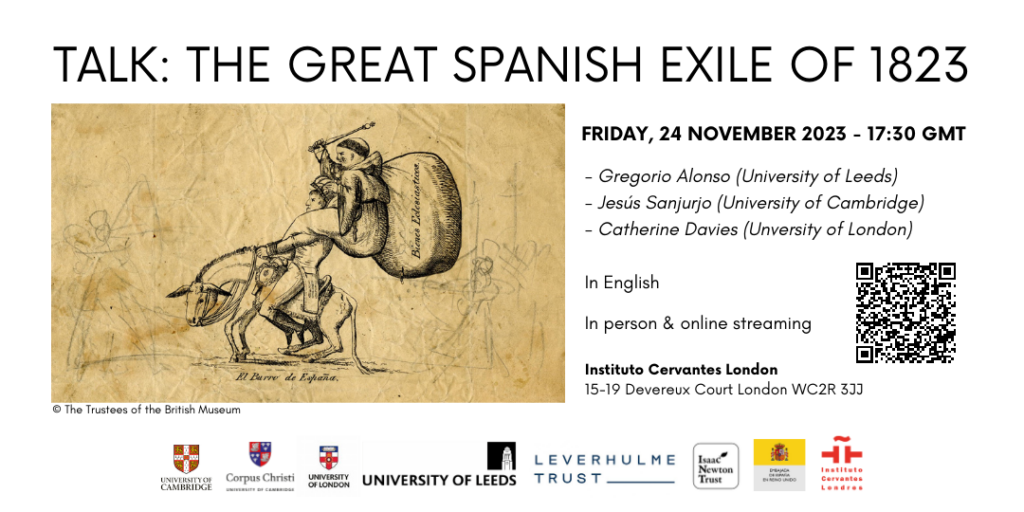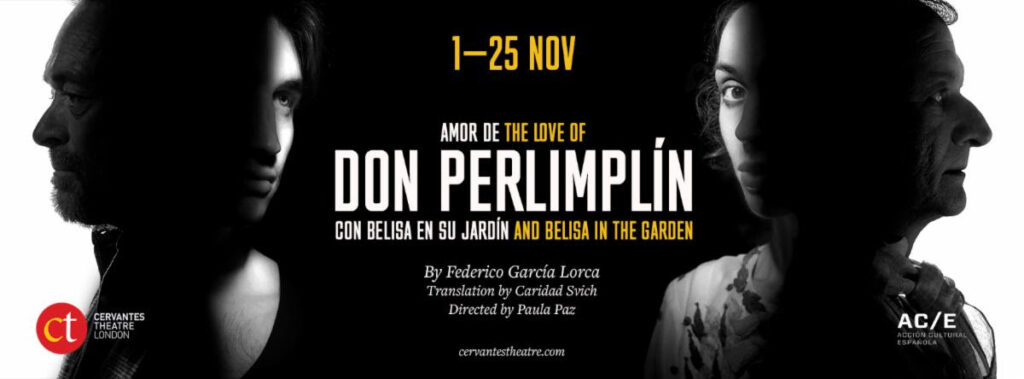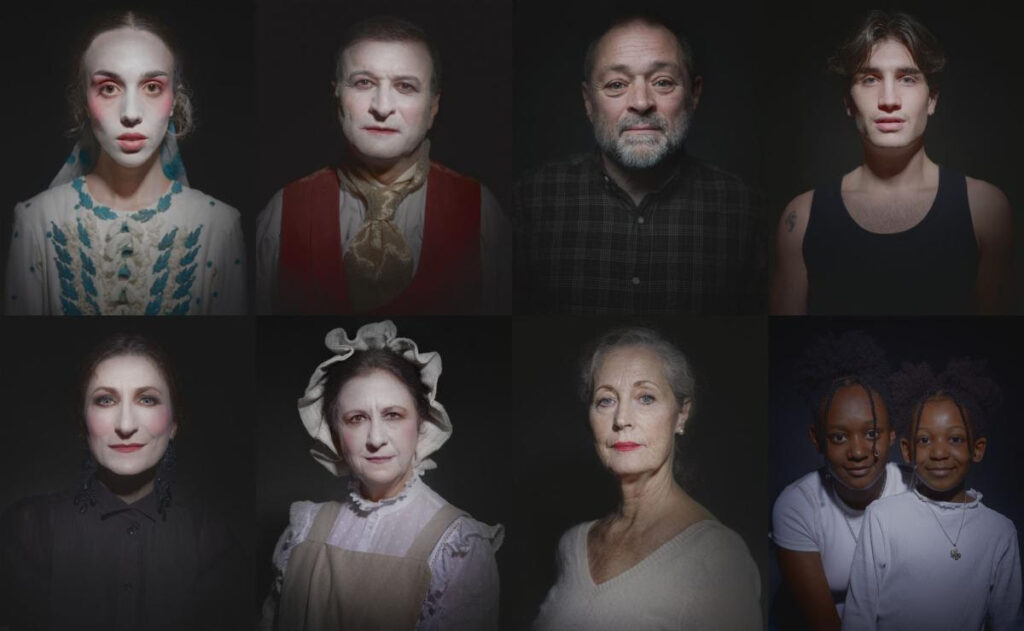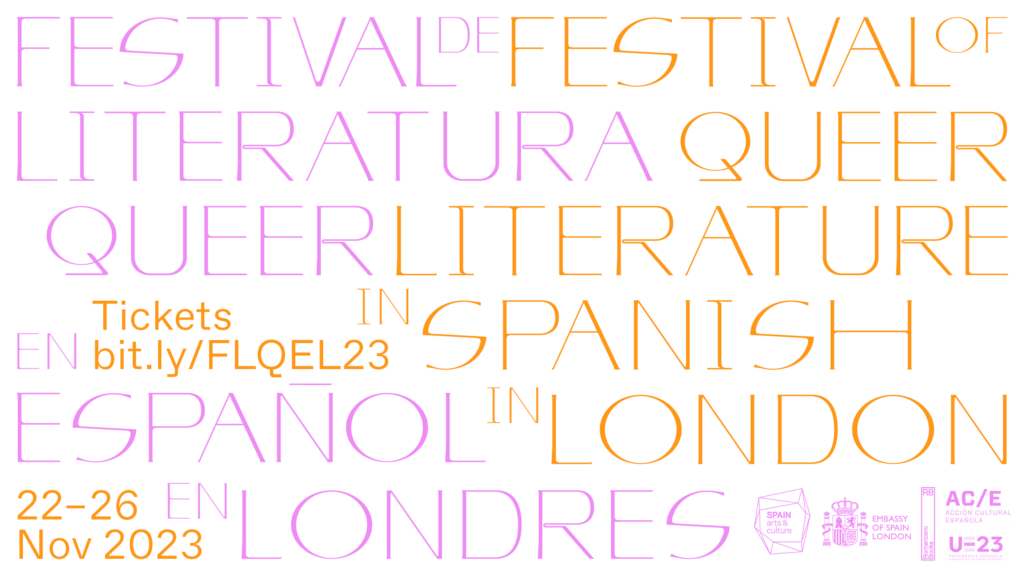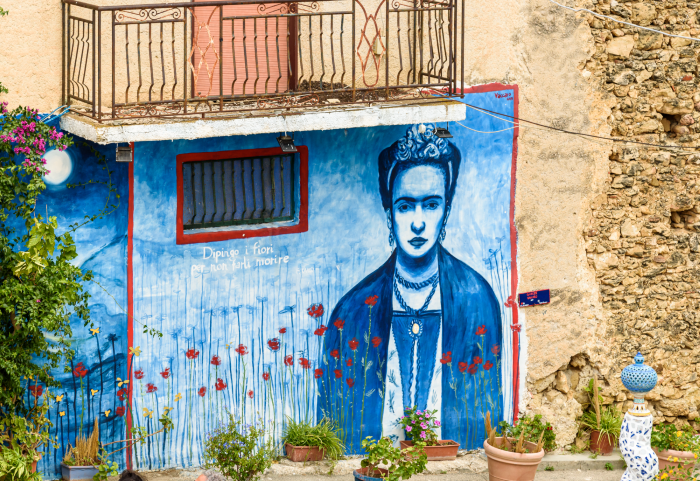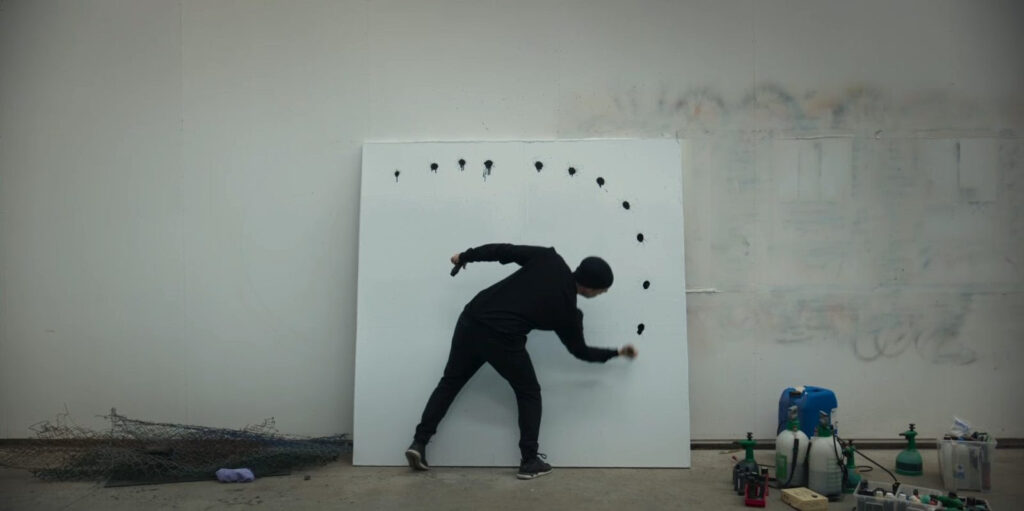Instituto Cervantes London hosts historical talk titled ‘The Great Spanish Exile of 1823’
Instituto Cervantes London welcomes Dr Gregorio Alonso (University of Leeds), Dr Jesús Sanjurjo (University of Cambridge) and Professor Catherine Davies (University of London) to explore a period of history not often discussed in a talk titled ‘The Great Spanish Exile of 1823’ on Friday, 24 November at 5:30pm.
The three academics will discuss this important event in Spanish history, which marked a period of political upheaval and forced departure of many liberal and progressive Spaniards, either by choice or to avoid political persecution.
This in-person and online activity is co-hosted by the Spanish Embassy to the United Kingdom and Instituto Cervantes London. «Since its creation, Instituto Cervantes London has been emphasising how the Hispanic presence in London adds value and contributes to the city’s cultural richness and diversity. Examples of this are the Cervantes Routes, specifically the ‘Routes of the Spanish exiles in London’ itineraries. On this occasion, three experts will tell the stories of the hundreds of Spaniards who were taken in and found protection,” says Víctor Ugarte, Director of Instituto Cervantes London.
Liberal exodus to London
After close collaboration between Great Britain and the Spanish authorities from 1808, the French occupation decreed by the Holy Alliance destroyed the liberal experience in September 1823. As a result, at least 1,000 Spanish families sought refuge in London.
Most of them lived in the London suburb of Somers Town, in the Euston-St Pancras area, where a tight-knit community quickly formed. The majority of the refugees were military officers, but noted intellectuals, politicians and skilled workers were also among them. Many were highly educated and put their minds to writing, translating and publishing to make a living.
Some of the most prominent liberal politicians and essayists of the time actively participated in a wave of new intellectual activity catalysed by London’s vibrant political and cultural life. Furthermore, London became a central hub for Spanish-speaking intellectuals from Spain and the Americas during this time.
Forced emigrations for ethnic and political reasons
Throughout history, Spain has witnessed various forced emigrations for ethnic and political reasons, such as the expulsion of Jews and Muslims who refused to convert to Christianity and the exile of more than half a million citizens in 1939.
«This was the case for more than 1,000 individuals who found refuge in London in 1823, following the restoration of the absolutist regime under Ferdinand VII. This episode has received some academic attention, but much remains unknown,» explains Jesús Sanjurjo, Early Career Fellow of the Leverhulme and Isaac Newton Trusts at the University of Cambridge and Corpus Christi College.
Spain became a focal point for British politics following the intervention of its armies in the war against Napoleon a few years earlier. Similarly, Britain had been regarded from Spain with a mixture of admiration, disdain and envy for some time, adds Sanjurjo.
“This is partly because the early industrialisation success of the British Isles was giving new impetus to their economy and international reputation. In 1823, London was competing on equal footing with Paris in its race to become the great metropolis of the West,” notes Dr Gregorio Alonso, Associate Professor in Hispanic History at the University of Leeds.
The city’s capacity to welcome and the material support it provided to political refugees was extended not only to the Spanish liberals fleeing Ferdinand’s repression, but also to the Greeks, Neapolitans, Prussians and Frenchmen who sought refuge in the British capital.
“This event will describe the men and women who found in London the protection and refuge that their homeland denied them and will also reflect on the difficulties they faced and the links they established with the people of London,” underlines Catherine Davies, Emerita Professor of Hispanic and Latin American Studies at the School of Advanced Study at the University of London.
Attention will also be paid to their relationship with the so-called American insurgents, who tried to forge alliances with the British authorities to throw off the Spanish imperial yoke. Thus, the event will explore the means by which London became the capital of Hispanic liberalism in the 1820s.
The Love of Don Perlimplín and Belisa in the Garden
This Wednesday 1st of November is opening night for The Love of Don Perlimplín and Belisa in the Garden, one of the most poetic plays by Federico García Lorca.
A gem of Spanish theatre repertoire that can be seen in both English and Spanish every night in a new and surprising production directed by the Cervantes Theatre Artistic Director Paula Paz.
From 1st until 25th November, for four weeks only, first act in Spanish with English surtitles and second act in English. You can’t miss this production!
Did you know that Don Perlimplín was first performed in the UK in 1945 right after World War II being one of the first Lorca texts to be performed outside of Spain? It was seen as a success, running for roughly 4 years but it also scandalised the bourgeois audience and was authorised but heavily censored.
Joan Littlewood said in 1945 «Lorca’s plays deal with the terrible barrier between the sexes which existed in his country and is perhaps not unknown here. … Surely the first impact of any work of art is disturbing and even destructive: we must risk this ‘unpleasantness’ if our culture is not to atrophy.»
*Research by Professor María Bastianes
Paula Paz releases this potential in Cervantes Theatre’s production of Don Perlimplín which sees the text unleashed whilst sticking true to Lorca’s vision.
Presentación de «El español en el mundo 2023. Anuario del Instituto Cervantes»
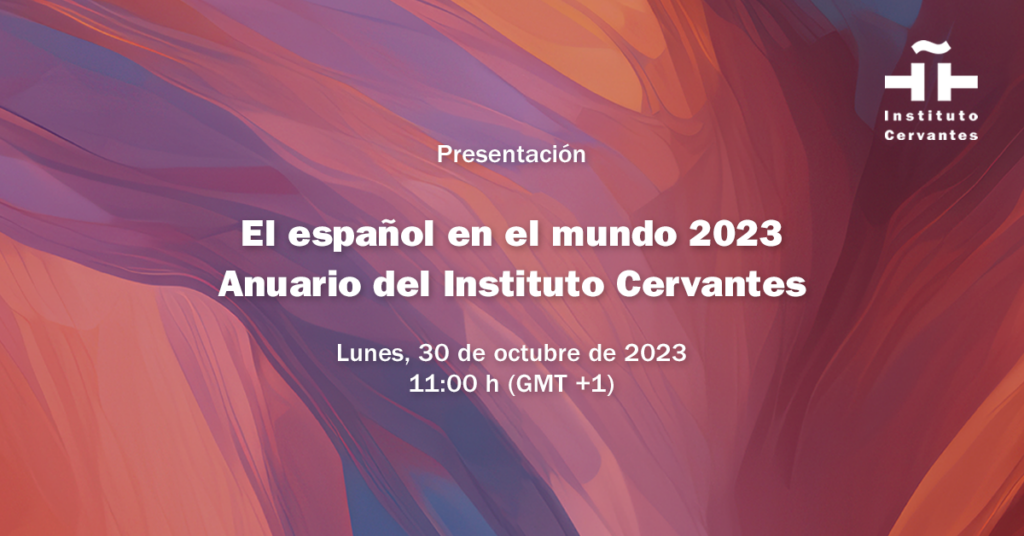
El Instituto Cervantes presenta el lunes 30 de octubre, a las 11 h (hora de Madrid), el anuario «El español en el mundo 2023», principal publicación académica de la institución en la que cada año se actualizan los datos más relevantes sobre la lengua española en el mundo, junto a otros asuntos de interés que atañen a la presencia internacional de la cultura hispánica.
Esta vigesimocuarta edición del Anuario del Instituto Cervantes aporta los últimos datos sobre la presencia internacional de nuestra lengua y detalla la situación específica del español en cinco países: Tailandia, Portugal, Ucrania, la República Democrática del Congo e Irán. Incluye además un amplio apartado titulado «Lenguajes para la inclusión», en el que seis autores reflexionan a lo largo de 120 páginas sobre la coexistencia de las lenguas de signos con el español, el lenguaje y la igualdad entre hombres y mujeres, la historia del braille, las pruebas de español para personas con trastornos como la dislexia o el lenguaje de la Administración.
En el acto de presentación pública, que cerrará José Manuel Albares, ministro en funciones de Asuntos Exteriores, Unión Europea y Cooperación, participarán:
• Luis García Montero, director del Instituto Cervantes
• Carmen Pastor Villalba, directora académica del Instituto Cervantes
• María Luz Esteban Saiz, directora del Centro de Normalización Lingüística de la Lengua de Signos Española (CNLSE)
• David Fernández Vítores, investigador y profesor de la Universidad de Alcalá (Madrid)
• Estrella Montolío Durán, catedrática de Lengua Española de la Universidad de Barcelona
• Andrés Ramos Vázquez, director general adjunto de servicios sociales de la Organización Nacional de Ciegos Españoles (ONCE)
The third edition of the Festival of Queer Literature in Spanish in London is here
The third edition of the Festival of Queer Literature in Spanish in London, a project that was born from
the London-based online bookstore Romancero Books CIC, will take place between Wednesday 22
and Sunday 26 November.
In this edition the festival will be a hybrid of online and face-to-face events, happening in different venues across the city; from the Spanish embassy, to the Cervantes Institute in London, Foyles Bookshop in Charing Cross, Poster Hauss in Dalston or The Common Press bookshop in Brick Lane.
The Festival of Queer Literature in Spanish in London – FQLSL is a meeting point for readers, writers, critics, and people interested in LGTBIQ+ culture
For this third edition of the FQLSL we are going to welcome some of the most outstanding names of
queer literature and LGTBIQ+ activism from Spain and Latin America, such as Elizabeth Duval, Art
History Dr. Javier Cuevas del Barrio, poet Sara Torres, fashion and queer culture photographers Paco
y Manolo, Leticia Ybarra, Alejandro Simón Partal, Natalia Figueroa, Juan de Salas, Las Hijas de
Felipe and talks about Nazario, Ocaña and María de Zayas among others.
The programme consists of 7 live events, 2 podcast episodes and 2 online talks.
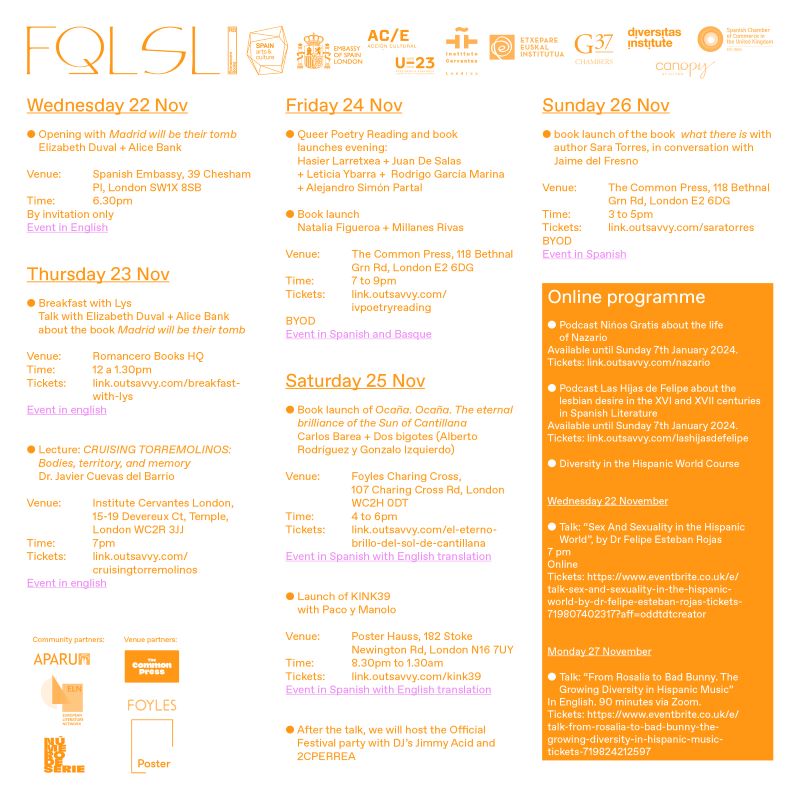
The festival’s objectives are:
Promote Spanish LGBTQI+ studies in the United Kingdom
Share the most recent queer literature written by Spanish and Latin American writers in the
United Kingdom
Remember the roots of queer writing and support the reclamation of writers who were subject
to censorship and suppression
Launch some of the latest LGBTQI+ books published in Spain during the past year
Support new voices in queer poetry and queer theatre
Build connections between British readers and queer literature written in Spanish and Catalan
by promoting their English-language translations
Build relations between Spanish writers & editors and their British colleagues for potential
future literature translations
Romancero Books CIC is an online bookshop of Spanish and Latin American literature based in
London. Our catalogue covers themes such as Lorca, female writers from Generación del 27, writers
in exile and diaspora and new LGBTQI+ voices as well a large programme of cultural events called
Romancero Talks.

Roser Vento-Tormo recibe el premio Talento Emergente CERU 2023
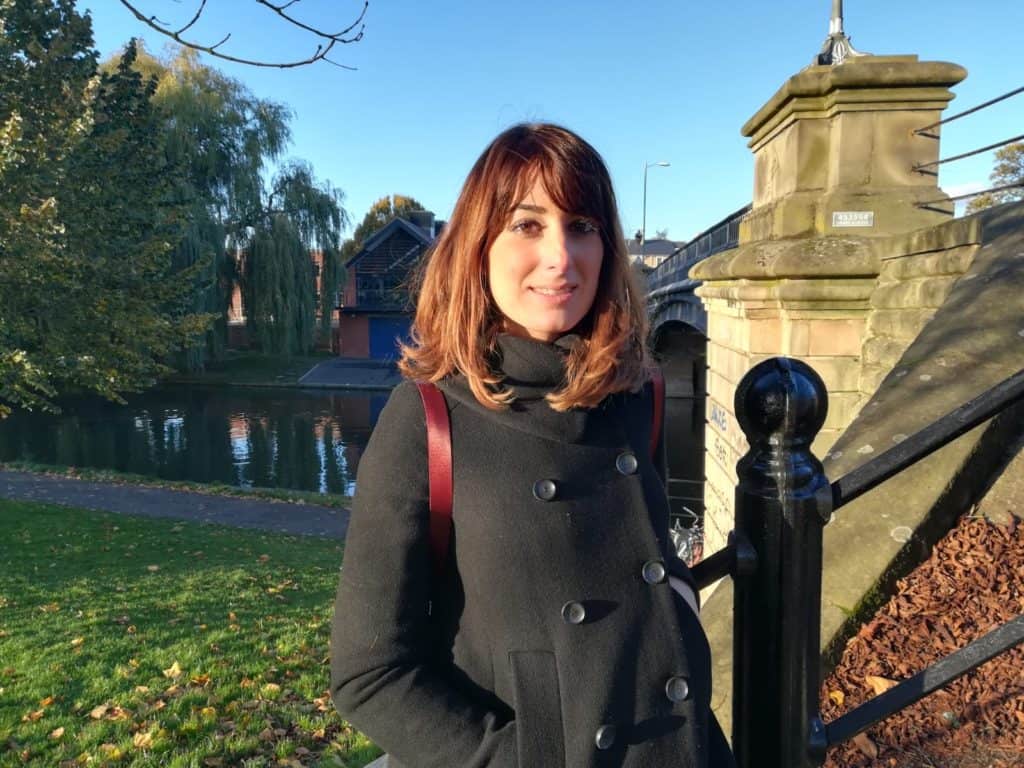
Este lunes, tuvo lugar la ceremonia de entrega del Premio Talento Emergente CERU en la Embajada de España en Londres, reconociendo las destacadas contribuciones a la investigación de Roser Vento-Tormo, ganadora de la edición 2023. El Premio Talento Emergente CERU, que celebra su 8ª edición este año, forma parte de la colaboración entre la Sociedad de Investigadores Españoles en el Reino Unido (CERU) y la Fundación Banco Santander.
La ceremonia de entrega contó con la presencia de José Pascual Marco Martínez, embajador de España en el Reino Unido; Rodrigo Echenique Gordillo, presidente de la Fundación Banco Santander; e Irene Echeverría Altuna, presidenta de CERU.
Durante la recepción, Echenique destacó que este Premio Talento Emergente CERU «desempeña un papel fundamental en el compromiso de la Fundación Banco Santander de apoyar la investigación científica, ayudando a crear nuevas oportunidades e impulsando el desarrollo de nuestros investigadores. Además, este premio tiene como objetivo clave, construir puentes y nutrir nuestro talento. Tiene poco sentido ver a nuestros investigadores emigrar a otros países sin seguir de cerca su progreso».
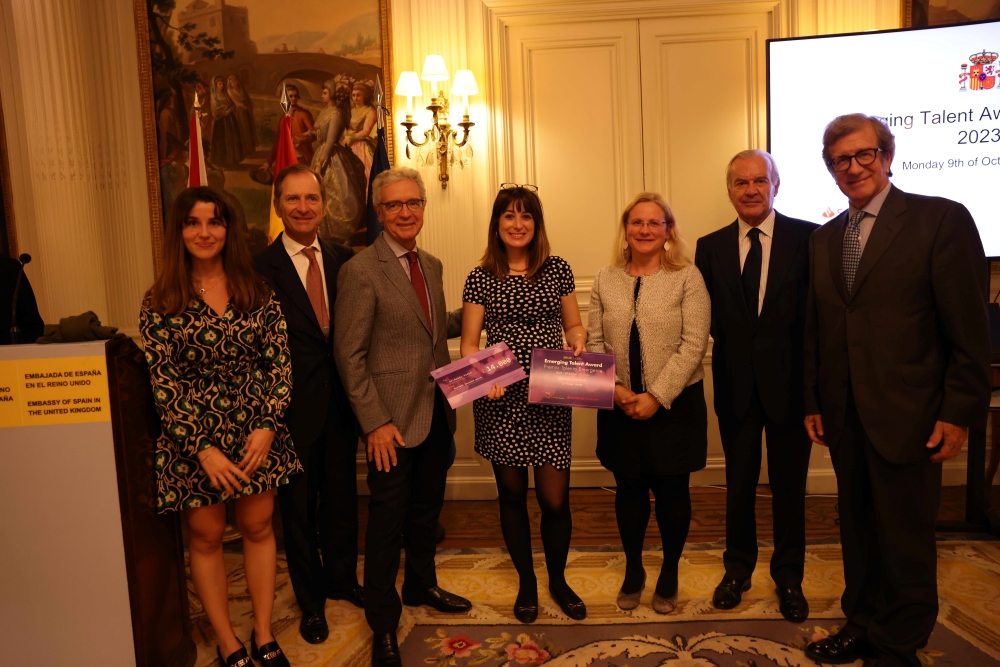
Roser Vento-Tormo, premio Talento Emergente CERU 2023.
Roser Vento-Tormo es la receptora del premio Talento Emergente CERU 2023 por su destacada carrera en el campo de la genómica y la bioinformática. El trabajo de Vento-Tormo ha sido respaldado por reconocidos organismos internacionales como el European Research Council (ERC), Wellcome Leap o la Chan Zuckerberg Initiative (CZI).
Además, ha recibido múltiples premios, entre los que destacan el Early Career Research Award from the Biochemistry Society (2021) y el Michelson & Science Prize Finalist (2023). El equipo liderado por Vento-Tormo ha utilizado innovadoras herramientas computacionales y genómicas para generar atlas de los tejidos reproductivos humanos, lo que ha llevado a avances transformadores en el campo de la salud de las mujeres.
Vento-Tormo destacó que «es un honor recibir este reconocimiento, en especial viniendo de una asociación de españoles que valora y celebra el talento innato que poseemos en nuestro país. Este premio no solo reconoce nuestra visión científica y nuestro enfoque creativo y colaborativo, sino que también destaca la importancia del área en la que hemos decidido centrarnos. Las enfermedades que afectan a las mujeres han sido históricamente subestimadas y poco exploradas, a pesar del profundo impacto que tienen en nuestra sociedad».
Con el Premio Talento Emergente, CERU apoya y visibiliza a científicos españoles en sus primeras etapas de carrera que realizan investigaciones en el Reino Unido, al tiempo que promueve colaboraciones entre ambos países.
Irene Echeverría Altuna, presidenta de CERU, afirmó que «en CERU, nos sentimos orgullosos de poder reconocer la excelente trayectoria de la Dra. Roser Vento-Tormo, que ejemplifica el enorme valor del trabajo que los investigadores españoles llevan a cabo en el Reino Unido. Estamos comprometidos con seguir acercando este trabajo a ambos países».
Instituto Cervantes London hosts a debate on the differences and similarities between the English and EU legal systems
On the occasion of the Spanish presidency of the Council of the European Union, Instituto Cervantes London is hosting a debate in English at 4:00 pm on Friday, 13 October on the differences and similarities between the English and European Union legal systems titled ‘English Law and EU Law: Still Two Separate Worlds?’.
The keynote speaker for the debate is Dr John Sorabji, Associate Professor at University College London (UCL) and Barrister at Nine St John Street Chambers. “There are greater similarities between our different forms of civil procedure than might be thought at first. The debate is undoubtedly interesting at the present time as we are all, to varying degrees, reforming our civil procedural systems due to digitisation, but also due to the UK’s departure from the European Union and the effects that will have over time,” explains Sorabji.
“While there are many areas where similarities and differences could be highlighted, particularly important ones in terms of similarities are the aims and objectives of all our systems, the focus on court management of proceedings and a distinction between first and second instance courts, while important differences include the approaches we take to obtaining evidence, the manner in which hearings take place and the role of the judge,” Sorabji adds.
A debate in the traditional home of the world of English law
The event at Instituto Cervantes London in Temple, the traditional home of the world of English law, is chaired by Bénédicte Paviot, the UK Correspondent for FRANCE 24 and Chair of the UK Advisory Board of Reporters Without Borders (RSF).
“Instituto Cervantes London is located among law firms in the heart of London and just a few metres from the Royal Courts of Justice. With this event, we hope to establish a closer relationship with our neighbours and for them to learn more about us on an occasion as special as the Spanish presidency of the Council of the European Union. Their response, especially that of The Law Society of England and Wales, has been fantastic, and bookings to attend sold out within hours, although the debate can still be followed online,” explains Víctor Ugarte, Director of Instituto Cervantes London.
“I think many will be surprised to see the similarities and differences between the EU and English-Welsh legal systems because there is still much common ground. Another topic of great interest that will be discussed during the debate is the validity of parts of EU law, or the so-called ‘retained EU law’,” Ugarte adds.
The afternoon programme includes welcome remarks by Ugarte, followed by a presentation by Jordi Nieva, the Chair of Procedural Law at the University of Barcelona, titled ‘Judicial Proceedings in Common and Civil Law: Searching for Common Bases’.
Nieva underlines that court cases in the UK are not so different in substance, even if outwardly they appear so, as they share the same historical origins. “It must be acknowledged that the civil law and common law procedural systems have been moving closer together for a long time. They may eventually converge completely in the future, and it is good to be aware of this,” he highlights.
Lluís Carreras, Professor of Procedural Law and Spanish lawyer, will give the talk ‘Bridging the Gap Between Common and Civil Law: An Expert Witness in Spanish Law before UK Courts’. “My experience as an expert witness has demonstrated that, in practice, when a British judge must apply a rule from the continental legal system, it is entirely possible to align the ‘legal minds’ and the application of ‘legal principles’ of both systems, thereby effectively contributing to the pursuit of justice in the specific case,” Carreras says.
Estelle Cros, Liaison Judge at the Embassy of France to the United Kingdom, will discuss ‘Retained EU Law and the Heritage of EU Law in the British Judiciary: A New Hybrid Law?’. To end, closing remarks will be provided by Oliver Chapman, International Policy Adviser for Europe and the CIS region at The Law Society of England and Wales.
Estelle Cros, Liaison Judge at the Embassy of France to the United Kingdom, will discuss ‘Retained EU Law and the Heritage of EU Law in the British Judiciary: A New Hybrid Law?’. To end, closing remarks will be provided by Oliver Chapman, International Policy Adviser for Europe and the CIS region at The Law Society of England and Wales.
Event details:
Friday, 13 Oct 2023 16:00 – 18:00 h.
Instituto Cervantes London | 15-19 Devereux Court | London WC2R 3JJ
El Instituto Cervantes de Londres acoge un debate sobre las diferencias y similitudes entre el sistema jurídico inglés y el de la UE
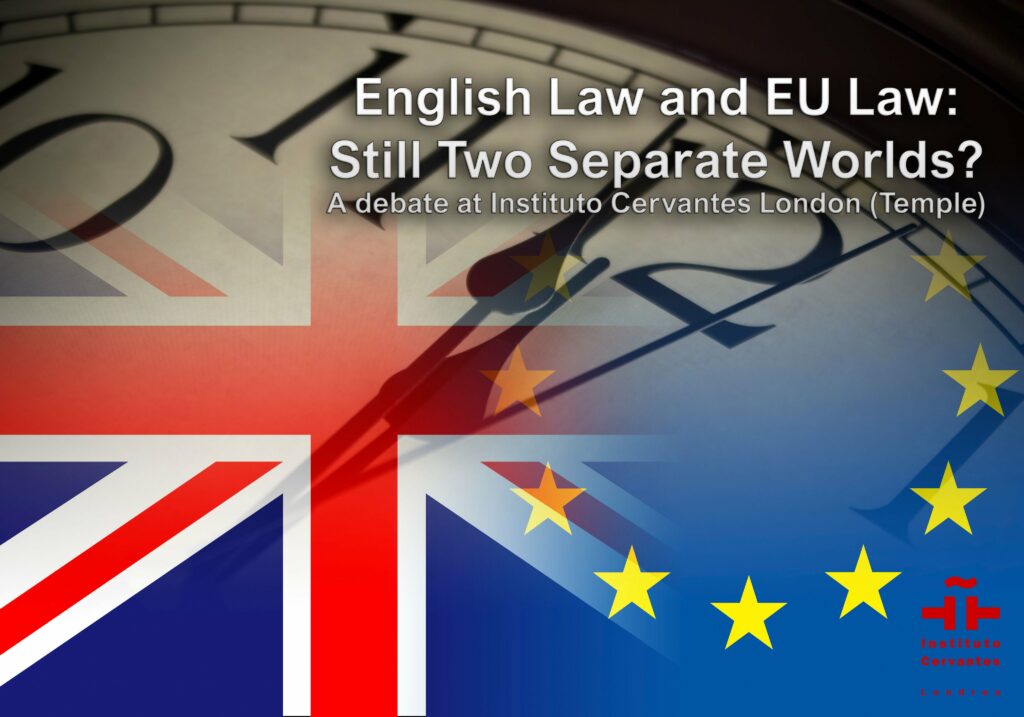
Con motivo de la Presidencia española del Consejo de la Unión Europea, el Instituto Cervantes de Londres acoge el viernes 13 de octubre, a las 16:00 horas, un debate en inglés sobre las diferencias y similitudes entre el sistema jurídico inglés y el de la Unión Europea: «Derecho inglés y de la UE: ¿Siguen siendo dos mundos separados?».
El ponente principal del debate es John Sorabji, profesor del University College London (UCL) y barrister en Nine St John Street Chambers. «Hay más similitudes entre nuestras diferentes formas de procedimiento civil de lo que podría pensarse a primera vista. El debate es, sin duda, interesante en la actualidad, ya que todos estamos, en mayor o menor medida, reformando nuestros sistemas procesales civiles debido a la digitalización, pero también a la salida del Reino Unido de la UE y a los efectos que tendrá con el tiempo», explica Sorabji.
«Aunque hay muchos aspectos en los que podrían destacarse las similitudes y las diferencias, entre las similitudes especialmente importantes se encuentran los fines y objetivos de todos nuestros sistemas, la atención prestada a la gestión judicial de los procedimientos, la distinción entre tribunales de primera y segunda instancia y, en cuanto a las diferencias, los enfoques que adoptamos para la obtención de pruebas, en la forma en que se celebran las vistas y el papel del juez», afirma Sorabji.
Un debate en la sede histórica del Derecho inglés
El acto en el Instituto Cervantes de Londres en Temple, sede histórica del mundo del Derecho inglés, estará dirigido por la corresponsal en el Reino Unido de FRANCE 24 y Presidenta del Consejo Asesor en el Reino Unido de Reporteros sin Fronteras (RSF), Bénédicte Paviot.
“El Instituto Cervantes de Londres está ubicado en el corazón del Londres de los despachos legales y a pocos metros de los Reales Tribunales de Justicia con quienes queríamos entablar una relación de vecindad y que nos conozcan en una ocasión tan especial como la Presidencia española del Consejo de la UE”, explica el director del Instituto Cervantes de Londres, Víctor Ugarte.
“Su respuesta, en especial la de The Law Society of England and Wales (asociación profesional que representa a los abogados en la jurisdicción de Inglaterra y Gales), ha sido fantástica y las reservas para asistir se agotaron en horas, si bien el debate podrá ser también seguido en línea. Creo que muchos se llevarán sorpresas al ver las similitudes y diferencias de los sistemas legales de la Unión Europea y el inglés-galés pues todavía hay muchos puntos en común. Otro tema de gran interés que se tratará en este debate es la vigencia de parte del derecho de la UE, la llamada Retained EU Law”, añade Ugarte.
El programa del viernes, 13 de octubre, incluye unas palabras de bienvenida del propio Ugarte, seguidas de una ponencia del catedrático de Derecho Procesal de la Universidad de Barcelona, Jordi Nieva, sobre ‘El proceso judicial en el Sistema de Derecho anglosajón y en el continental: En busca de bases comunes’.
Jordi Nieva subraya que los procesos judiciales en el Reino Unido no son tan diferentes en el fondo, aunque externamente lo parezcan, ya que provienen exactamente del mismo origen histórico: “Es preciso reconocer que los sistemas procesales del sistema de Derecho anglosajón y en el Derecho continental hace tiempo que se están aproximando muchísimo. Pueden acabar convergiendo completamente en el futuro, y es bueno ser conscientes de ello”.
El profesor de Derecho Procesal y abogado español, Lluís Carreras, hablará sobre ‘Cómo salvar la brecha entre el Derecho anglosajón y en el continental: Un experto en Derecho español ante los tribunales británicos’. «Mi experiencia como perito me ha demostrado que, en la práctica, cuando un juez británico debe aplicar una norma del sistema jurídico continental, es perfectamente posible alinear las «mentes jurídicas» y la aplicación de los «principios jurídicos» de ambos sistemas, contribuyendo así eficazmente a la búsqueda de la justicia en el caso concreto», añade Carreras.
Por su parte, la intervención de la jueza de enlace de la Embajada de Francia en el Reino Unido, Estelle Cros, tratará sobre ‘El Retained EU Law y el Legado del Derecho de la Unión Europea en la Judicatura Británica: ¿Un nuevo Derecho híbrido?’. La clausura correrá a cargo de Oliver Chapman, asesor de política internacional para Europa y la región de la Comunidad de Estados Independientes (CEI, por sus siglas en inglés) de la Law Society de Inglaterra y Gales.
El debate cuenta con el apoyo de la Embajada de España en el Reino Unido, la Embajada de Francia en el Reino Unido, la Delegación de la Unión Europea en el Reino Unido, la Law Society of England and Wales, la Cámara de Comercio de España en el Reino Unido y la British Spanish Law Association.
Detalles del evento
Viernes, 13 de octubre 2023 16:00 – 18:00 h.
Instituto Cervantes Londres | 15-19 Devereux Court | London WC2R 3JJ
Continúa en octubre nuestro cineclub virtual Cita con el cine
Del 13 al 27 de octubre vemos Alegría (2021), comedia dramática dirigida por la cineasta española Violeta Salama.
Alegría nos cuenta una historia intercultural y de convivencia religiosa en la ciudad de Melilla, inspirada en las propias raíces de la directora.
El día 26 de octubre, a las 18:00 h (GMT +2), habrá un interesante chat sobre la película con su directora, Violeta Salama. Además, durante la actividad contaremos con la participación de dos invitados de excepción: Pepe Vargas, director del Chicago Latino Film Festival, y Jorge Enrique González, director del Seattle Latino Film Festival.
Sinopsis: Alegría vive en Melilla y lleva muchos años distanciándose de sus raíces judías. La llegada de su sobrina para casarse altera el equilibrio de su vida. ¿Será este el momento de reconciliarse con su propia hija, a quien no ha visto en años, ahora vive en Israel y es madre ella misma? Inspirada en las propias raíces de la directora, Alegría es una película de y sobre mujeres, amistad y comprensión más allá de la religión y la cultura, así como de los conflictos y las contradicciones internas.
Disfruta del mejor cine en español y participa en este cineclub desde cualquier lugar.
Online cultural course: “Diversity in the Hispanic World”, coordinated by Dr. Emma Luisa Cahill Marrón
The “Diversity in the Hispanic World” course aims to present key aspects of the growing diversity of Hispanic culture. Since the Renaissance, it has played a key role in the making of the modern world. The course covers topics that speak of its diversity like: what conforms the Hispanic culture and why it is important historically, the role played by royal women in the patronage of the arts to conform one of the most important art collections in the world, the expressions of queerness in Hispanic literature throughout history, the current influence of music in Spanish due to artists like Bad Bunny and Rosalía or the most common historical misconceptions that circulate due to myths. The result will be a better understanding of the aspects that have contributed to making Hispanic culture a world phenomenon.
5 sessions: 90 minutes each, via Zoom
Price: £85 (Diversity in the Hispanic World Course + Gift Instituto Cervantes eLibrary+Library valued £40)
Discounted price (Instituto Cervantes London’s students and British universities’ students): £75 (Diversity in the Hispanic World Course + Gift Instituto Cervantes eLibrary+Library valued £40)
In English
A certificate of attendance will be issued at the end of the course.
Course sessions
Session 1 – 8 November 2023 – 7pm (GMT) – The Power of Diversity in the Hispanic World – Dr Emma Luisa Cahill Marrón
This class is an introduction to today’s growing diversity in Hispanic culture. What does it mean to be Hispanic in our current world? Is this growing diversity something new or part of this culture’s historical development? The answers to these and other questions will be outlined to show the power of a global culture that started in the Renaissance and that has deeply influenced the world since the fifteenth century due in great measure to its diversity.
Session 2 – 13 November 2023, 7 pm (GMT) – The Female Perspective. A Trailblazing Gender Project in the Prado Museum – Dr. Noelia García Pérez
This class is a presentation of The Female Perspective, a project focused on the women who greatly contribute with their art patronage to the development of the collections of the Prado Museum. Among all European museums, the Prado is probably the one in which women have played the most decisive role regarding its configuration, either as collectors and promoters or through key contributions to its foundation and existence.
Session 3 – 22 November 2023, 7 pm (GMT) – From Rosalía to Bad Bunny. The Growing Diversity in Hispanic Music – Dr. Emma Luisa Cahill Marrón
This class is an overview of literary expressions of queerness in the Spanish-speaking world in the Iberian Peninsula, moving to the New World up to the 21st century. While the term ‘homosexuality’ and ‘queer’ did not become markers to denote members of the LGBTQIA+ community until recent history, these words had their predecessors. This class outlines the different avenues Hispanic artists used to communicate the presence of queerness throughout geographical space and time.
Session 4 – 27 November 2023 , 7 pm (GMT) – Sex And Sexuality in the Hispanic World – Dr. Felipe Esteban Rojas
This class is an immersion in the worldwide success of music written in Spanish. Artists like Rosalía or Bad Bunny have become powerhouse names in mainstream music. They top the charts in many countries and sell out world tours. Why is everybody listening to music in Spanish? In this class we will delve into the use of Hispanic culture as a vehicle to influence the entertainment industry. This will shed some light into key reasons why this music has become a world phenomenon.
Session 5 – 4 December 2023, 7 pm (GMT) – Let us have a Bloody Mary and Talk about Hispanic Myths – Dr. Emma Luisa Cahill Marrón
This class examines some of the most common historical misconceptions about the Hispanic world in mainstream culture. From Bloody Mary to the Spanish flu, literature and propaganda written in English have often portrayed wrong images of Hispanic culture and its people. This has contributed to shaping some misconceptions about the Hispanic world that can be discarded as myths when compared to the historical facts.
19th London Spanish Film Festival: 20-27 September. Save the dates!
| Our lineup for our 19th edition includes films from all corners of Spain, new feature films, documentaries, international co-productions, shorts and some wonders from the archives. Our opening and closing nights are devoted to two of the films we are bringing from Andalusia and, as for the past several years, films from the Basque Country and Catalonia will have special sections celebrating the wealth of Spain’s cultural diversity. We’ve also partnered with Durham University’s Santiago Fouz-Hernández to bring to London audiences an essential part of their Bigas Luna Tribute. With the Tribute, a very small but very special exhibition that we will celebrate after the screening of Jamón, jamón with Alhambra beer and with our friends at Spanish Ham Master and… yes, jamón – the best! Check our program and make the most of this special occasion to see some truly great films on the big screen and meet talents from Spain! |
